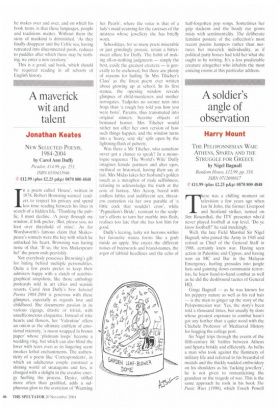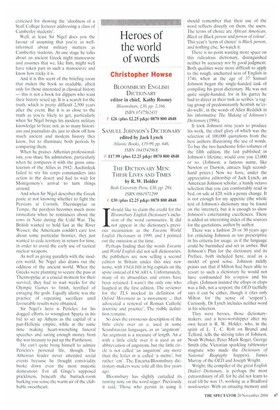A soldier's angle of observation
Harry Mount
THE PELOPONNESIAN WAR: ATHENS, SPARTA AND THE STRUGGLE FOR GREECE by Nigel Bagnall Random House, £12.99, pp. 318, ISBN 0712698817 V £11.99 (plus £2.25 p&p) 0870 800 4848 There was a chilling moment on television a few years ago when Ian St John, the former Liverpool and Scotland striker, turned on Jim Rosenthal, the ITV presenter who'd never played football at top level. 'Do ye know football?' he said mockingly.
Well, the late Field Marshal Sir Nigel Bagnall, who joined the Army in 1945 and retired as Chief of the General Staff in 1988, certainly knew war. Having seen action in Palestine and Cyprus, and having won an MC and Bar in the Malayan Emergency, hurling grenades into jungle huts and gunning down communist terrorists, he knew hand-to-hand combat as well as he did the deskbound tactics of General HQ.
Ginge Bagnall — as he was known for his peppery nature as well as his red hair is the man to ginger up the story of the Peloponnesian war. Yes, the story's been told a thousand times, but usually by dons whose greatest exposure to combat hasn't got any further than a quiet word with the Chichele Professor of Mediaeval History for hogging the college port, Sir Nigel trips through the events of the fifth-century BC battles between Athens and Sparta briskly and efficiently. As befits a man who took against the flummery of military life and referred to his breastful of medals and the thickly wadded embroidery on his shoulders as his 'fucking jewellery', he is not given to romanticising the grandeur or the tragedy of war. This is the same approach he took in his book The Punic Wars (1990), which Enoch Powell criticised for showing the 'aloofness of a Staff College lecturer addressing a class of Camberley students'.
Well, at least Sir Nigel does you the favour of assuming that you're as wellinformed about military matters as Camberley students. At one stage he talks about an ancient Greek night manoeuvre and assumes that we, like him, might well have taken part in such a manoeuvre and know how tricky it is.
And it is this scent of the briefing room that makes the book so readable, albeit only for those interested in classical history — this is not a book for dippers who want their history sexed up. It is a search for the truth, which is pretty difficult 2,500 years after the event. But it is as close to the truth as you're likely to get, particularly when Sir Nigel brings his modern military knowledge to bear; not, as so many historians and journalists do, just to show off how much ancient and modern history they know, but to illuminate both periods by comparing them.
When he praises Athenian professionalism, you share his admiration, particularly when he compares it with the gross amateurism of the Allies in 1942: Auchinleck failed to stir his corps commanders into action in the desert and had to wait for Montgomery's arrival to turn things around.
And when Sir Nigel describes the Greek panic at not knowing whether to fight the Persians at Corinth, Thermopylae or Tempe, the paralysis becomes much more immediate when he reminisces about the rows in Nato during the Cold War. The British wanted to hold fast at the River Wesser; the Americans couldn't care less about some particular frontier, they just wanted to cede territory in return for time, in order to avoid the early use of tactical nuclear weapons.
As well as giving parallels with the modern world, Sir Nigel also draws out the oddness of the ancient world. When the Greeks were planning to secure the pass at Thermopylae at a crucial moment for their survival, they had to wait weeks for the Olympic Games to finish, terrified of enraging the gods. Equally idiotic was the practice of repeating sacrifices until favourable results were obtained.
Sir Nigel's hero is Pericles: for his dogged efforts to wrongfoot Sparta in his bid to set up Athens as the capital of a pan-Hellenic empire, while at the same time making heart-wrenching funeral speeches and saving enough money from the war treasury to put up the Parthenon.
He can't quite bring himself to admire Pericles's personal life, though. The Athenian leader never attended social events because he thought conviviality broke down even the most majestic demeanour. For all Ginge's supposed prickliness, beneath the barrack-room barking you sense the warm air of the clubbable sweetheart.



























































































 Previous page
Previous page